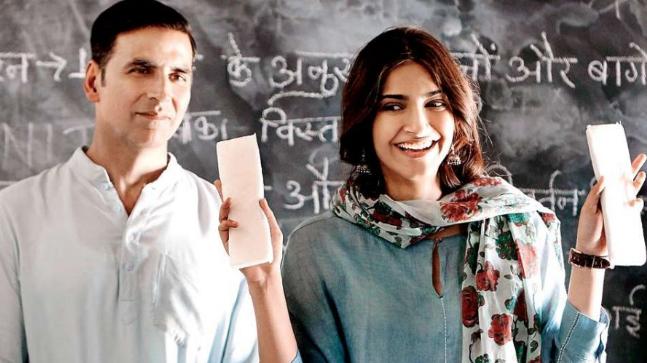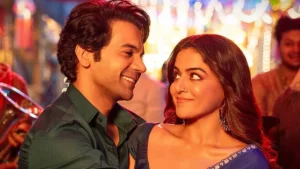
“In paanch dinon mein ghar baithne ki koi zaroorat nahi,
Ab aap aaram se school jaa sakte hain”
This is a line by actor Sonam Kapoor in director R. Balki’s Pad Man. Now every movie watcher and his dog has an opinion on Ms Kapoor’s histrionic abilities. Not debating any further on this, we are sure that the actor is well aware of the difference in diction when it comes to standards of feature films and advertisements in India. She mugs up the above lines as if she were on the sets of a L’Oreal commercial. I could almost imagine a follow-up line, “Ab payiye 4 pratishat zyada absorbing power ke saath,” I’m sure the editor wanted to spare us from the horror.
This identity crisis runs all throughout Pad Man, which presumably is a well-intended film. We really don’t know what to call it though. A documentary, an extended public service announcement, a biopic – Pad Man is a mix of them all but wants to pretend as a full-blown family entertainer. Result? A middling film, streamlined through a series of unexciting events, foreseeable twists and, again, trite supporting characters.
Padman kicks off with a shimmering Amit Trivedi melody called ‘Aaj Se Teri’. Call it the magic of Arijit Singh’s voice or Kausar Munir’s poetry, the song remains the only testimony to the fact that Lakshmikant aka Lakshmi’s (Akshay Kumar) wife Gayatri (Radhika Apte) had any sort of liking for him. The song halts and the actress begin to flaunt a perennial expression of disgust. I’m sure she wasn’t as worried about their palpable age difference as much as the audience members were. Why couldn’t she just smile or rather act normal than hover around with that timid body language of hers every time her husband approached her? Of course, Apte is one of the finest actors in India, who isn’t bad here either. We also understand the prevalent social conservations in the film’s environment. Yet, the writers (R. Balki, Swanand Kirkire) fail to ignite a fleshy bond between the two rendering Gayatri to be a harshly one-note individual, which becomes the film’s primary liability. This is not to say that we are not on Lakshmi’s side through his journey. The film manages to get us under ‘Team Lakshmi’ right from the initial reels and that’s no mean achievement for a film as lazily made as Pad Man.
Yes, Akshay Kumar’s Lakshmi is designed to fit his superstar trappings where the hero’s journey is enthralling. It, indeed, is and more so if we look at him in singularity. What we really don’t care is the reason why Lakshmi wants to make low-cost sanitary pads. If his intent is to achieve a personal goal, we are all for it. In stark contrast, Balki’s Pad Man wants to be a God-sent saviour. One can’t really argue that this is a biographical film and the actual incidents shall not be tampered with. The writers, for the records, have worked hard enough to juxtapose the real ‘Pad Man’ Arunachalam Muruganantham’s story from Coimbatore to a more acceptable savarna (upper-caste), shakahari (vegetarian) Hindu family based in Madhya Pradesh. Additionally, besides Lakshmi, we don’t tend to approve of the peripheral characters. Even if they happen to be as small as Pari’s doting single dad who surfaces briefly to make certain unintentionally patronizing statements. Let’s not even get into the act of Lakshmi seeking appreciation from his estranged wife and other regressive village folks even after he achieves more than what he had set out to.
Unlike most uninteresting Indian feature films, Pad Man doesn’t bring about any relief after the midpoint either. There are intermittent touches (especially by Kumar) that make us flash a smile or two. Then again, the actor knows how to put our funny bones to good use. The film’s lacklustre screenplay, unfortunately, leaves no scope for him to exercise beyond his natural charm. As a result, the finale ends up as dry, over-rehearsed and, in turn, moves no one. I couldn’t stop plotting nodes between a similar scene in Gauri Shinde’s English Vinglish, that appeared at a similar juncture. Unlike Shashi (Sridevi), Lakshmi’s speech out doesn’t contain a bagful of emotions. And that polished accent of his while delivering broken English does no good either. Watching all of it unfold, a proud and emotionally charged Pari (Kapoor) smiles warmly from the balcony. This is also worthy of a laugh because the duo – representing either side of the education spectrum – never utter the word ‘period’ even once in the film. Too much of a cost for normalizing a mere body process, I say.
*Spoiler begins*
It also looks like Balki and his better half (Shinde) have similar beliefs when it comes to morals in romantic relationships. However, Balki’s Pari in Pad Man is served a bigger disservice in comparison to Shinde’s Laurent (Mehdi Nebbou) in English Vinglish. The former’s wasn’t exactly an instance of infatuation. Moreover, her object of desire was ‘bound’ to his wife by a forceful, unbreakable union that marriage is supposed to be in rural areas. We don’t see Lakshmi remembering Gayatri throughout the latter half, and still, she gets a better deal just because she is the legally-wedded wife. And finally, when Lakshmi’s weirdly stagey villagers greet him with garlands, we can’t fathom how these folks (and Gayatri) care only if one achieves celebrity status or is recognized by a governmental body. Now I know why young Indian men suddenly turn eligible bachelors upon clinching government jobs.
*Spoiler ends*
Finally, for the zillionth time, one wonders what Sonam Kapoor is doing in a film. She is an all-empowered B-school lass who performs at tabla recitals. She lives in fancy resorts that stock no sanitary pads. Sonam’s Pari appears no less than a celebrity as she has an exclusive concert for herself, for which she had travelled all the way from New Delhi to a town in Madhya Pradesh. Oh, boy! Later she joins Lakshmi in his Pad revolution and we don’t even know why she does that. I could almost hear that line from Aisha, “Because I believe in charity,” Fair enough, babe!
Having said that, Balki’s Pad Man is not as atrocious and loud as Toilet – Ek Prem Katha, which is another unmissable entrant that celebrates Kumar’s recently acquired uber-nationalist persona. It is just that Pad Man doesn’t possess the merits to engage its viewers, let alone entertaining them. For the first ever, I didn’t bother to pay much heed to PC Sreeram’s lush frames. Pad Man is one film that is perfect for a passive viewer as you can easily sit through with buzzing mobile phones, snack delivery guys and wailing babies doing their undesignated jobs in dark cinema halls. No, I didn’t mind any of them inside the auditorium, which was a first and I am yet to get over that shock.
Rating: ★★ 1/2

